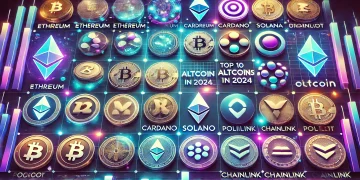In recent years, blockchain technology has emerged as one of the most transformative and revolutionary innovations across industries. Despite its rapid adoption, many people still find it challenging to grasp the core concepts behind blockchain, especially its function as a distributed ledger. This guide is designed to break down blockchain technology in simple terms, making it accessible for beginners while providing a deep understanding of how distributed ledgers work and their potential impact on various sectors.
What is Blockchain?
At its core, blockchain is a type of database or ledger that stores information in a secure, decentralized manner. Unlike traditional databases maintained by a single entity, blockchain operates on a network of computers, called nodes, that collectively manage and verify the data. Each piece of information is stored in blocks, which are linked together (or “chained”) to form a chronological, tamper-resistant record of transactions.
The main feature that distinguishes blockchain from conventional databases is its decentralized nature. Rather than relying on a central authority to manage the database, a blockchain is maintained by a distributed network. This decentralization offers several benefits, including enhanced security, transparency, and resistance to tampering or fraud.
The Origins of Blockchain Technology
Blockchain’s origin is closely tied to the creation of Bitcoin in 2008. Bitcoin, the first decentralized cryptocurrency, was developed by an anonymous entity known as Satoshi Nakamoto. To support Bitcoin, Nakamoto introduced blockchain technology as the underlying system that could record transactions without the need for intermediaries like banks or governments.
Initially, blockchain was synonymous with cryptocurrencies. However, as its potential became more apparent, innovators and technologists began exploring its use in areas beyond finance, leading to the development of a wide range of applications that rely on distributed ledger technology.
How Blockchain Works: The Building Blocks
To fully understand blockchain, it’s crucial to break down its components and the mechanisms that enable it to function effectively. Here are the key elements of a blockchain:
1. Blocks
A blockchain is composed of individual units called blocks. Each block contains several pieces of information, including:
- Transaction data: This can represent anything from cryptocurrency exchanges to digital contracts, supply chain data, or other records.
- Hash: A unique code generated by a cryptographic algorithm that serves as a digital fingerprint for the block.
- Previous block’s hash: Each block contains the hash of the previous block, linking them together in a chain-like structure.
By chaining blocks together in this manner, blockchain creates an unalterable record of all transactions. If a single block is tampered with, it changes the block’s hash, breaking the chain and alerting the network to potential fraud.
2. Decentralization
Unlike traditional databases, where a single entity controls the data, blockchain relies on a decentralized network of nodes. Each node has a copy of the entire blockchain, and when new transactions occur, all nodes must agree on the validity of the transaction before it is added to the blockchain.
This process is known as consensus. By requiring a majority of nodes to agree, blockchain ensures that no single party can manipulate the data. This decentralization not only makes the system more secure but also more transparent, as anyone with access to the network can view the transactions recorded on the blockchain.
3. Cryptography
Security is a critical feature of blockchain, and it relies heavily on cryptography to ensure that data is secure and verifiable. Cryptography protects the information stored in blocks, ensuring that transactions are encrypted and can only be accessed by authorized parties. Additionally, cryptographic hashing is used to link blocks together, making it difficult to alter the blockchain’s history without detection.
4. Consensus Mechanisms
One of the key challenges in a decentralized system like blockchain is ensuring that all participants (nodes) agree on the state of the blockchain. This is achieved through consensus mechanisms—protocols that validate transactions and add them to the blockchain. The two most common consensus mechanisms are:
- Proof of Work (PoW): This method, used by Bitcoin, requires participants (called miners) to solve complex mathematical puzzles to validate transactions. Once a puzzle is solved, the miner can add a new block to the blockchain, and they are rewarded with cryptocurrency.
- Proof of Stake (PoS): In PoS, validators are chosen based on the number of coins they hold and are willing to “stake” as collateral. This method is seen as more energy-efficient than PoW, as it doesn’t require intensive computational work.
Both consensus mechanisms aim to ensure that the blockchain remains secure, decentralized, and resistant to attacks or fraud.
Blockchain as a Distributed Ledger
One of the most important functions of blockchain is its role as a distributed ledger. A distributed ledger is essentially a database that is replicated, synchronized, and shared across multiple locations or participants. In blockchain, this ledger is maintained by the network of nodes rather than a single centralized entity.
The distributed nature of blockchain ledgers offers several advantages:
- Transparency: Because each participant has a copy of the entire blockchain, transactions are transparent and can be easily audited.
- Security: The distributed nature of the ledger makes it difficult for a single party to alter or hack the system. Any changes must be approved by a consensus of the network.
- Immutability: Once a transaction is recorded on the blockchain, it is almost impossible to change. This ensures that the record is accurate and trustworthy.
The concept of a distributed ledger has broad applications beyond cryptocurrencies. For example, industries such as supply chain management, healthcare, and real estate are exploring blockchain to create more efficient, secure, and transparent record-keeping systems.
Applications of Blockchain Technology
Blockchain technology is rapidly expanding beyond the realm of cryptocurrencies, with various industries adopting it to streamline processes, enhance security, and foster trust. Below are some key areas where blockchain is making a significant impact:
1. Cryptocurrencies
The most well-known application of blockchain is in the creation of cryptocurrencies like Bitcoin and Ethereum. Blockchain enables these digital currencies to operate without the need for intermediaries, such as banks, by maintaining a secure and decentralized record of transactions.
2. Smart Contracts
Smart contracts are self-executing contracts with the terms of the agreement directly written into code. They automatically execute when predefined conditions are met, without the need for a central authority. Ethereum, one of the most popular blockchain platforms, is known for enabling the creation of smart contracts.
Smart contracts have the potential to revolutionize industries such as real estate, law, and finance by automating processes that typically require manual intervention and reducing the need for intermediaries.
3. Supply Chain Management
Blockchain technology offers increased transparency and traceability in supply chains. By recording each step of the supply chain on a distributed ledger, companies can ensure that products are sourced ethically, counterfeits are avoided, and customers have greater visibility into the origins of the products they buy.
4. Healthcare
In the healthcare industry, blockchain is being used to secure patient data, streamline medical record-keeping, and ensure the integrity of pharmaceutical supply chains. The transparency and immutability of blockchain make it an ideal solution for improving data security and reducing fraud.
5. Voting Systems
Blockchain has the potential to revolutionize voting systems by providing a secure and transparent platform for casting and counting votes. With blockchain, each vote is recorded on a tamper-resistant ledger, ensuring that the election process is transparent and verifiable.
Advantages and Challenges of Blockchain
Like any technology, blockchain comes with its own set of advantages and challenges. Understanding these is key to determining how and when to implement blockchain solutions.
Advantages of Blockchain
- Security: Blockchain’s use of cryptography and decentralization makes it highly secure. Transactions are verified by multiple participants, making it difficult for a single entity to manipulate the data.
- Transparency: Because every transaction is recorded on a public ledger, blockchain ensures a high level of transparency. This is particularly beneficial in industries where trust and verification are critical.
- Immutability: Once information is recorded on the blockchain, it cannot be easily altered or deleted. This immutability ensures the accuracy and reliability of the data over time.
- Efficiency: In many cases, blockchain can streamline processes by eliminating intermediaries, reducing the time and cost associated with verifying and processing transactions.
Challenges of Blockchain
- Scalability: One of the main challenges facing blockchain is its scalability. As the size of the blockchain grows, so does the amount of data that needs to be processed and stored by each node. This can lead to slower transaction speeds and higher costs, particularly for public blockchains.
- Energy Consumption: The Proof of Work consensus mechanism used by many blockchain platforms, such as Bitcoin, requires significant computational power, leading to concerns about energy consumption and environmental impact.
- Regulation: Blockchain operates in a relatively unregulated space, which can create challenges related to legal compliance, especially in sectors like finance and healthcare. Governments and regulatory bodies are still grappling with how to manage and regulate blockchain-based systems.
- Adoption: Despite its potential, blockchain adoption remains slow in certain industries. This is partly due to the complexity of the technology and the lack of standardization across platforms.
The Future of Blockchain
Blockchain technology is still in its early stages, but its potential to transform industries is undeniable. As more businesses and governments explore its applications, we can expect to see a rise in blockchain-based systems designed to improve security, efficiency, and transparency.
In the coming years, advancements in blockchain technology will likely focus on addressing current challenges, such as scalability and energy consumption, while expanding the use of blockchain across sectors like healthcare, supply chain management, and public administration.
Moreover, as more industries recognize the value of decentralized systems, blockchain may become a foundational technology for the future of data management and digital transactions. The integration of blockchain with other technologies like artificial intelligence (AI) and the Internet of Things (IoT) could open new avenues for innovation and development, making blockchain an essential component of the digital economy.
Conclusion
Blockchain technology represents a paradigm shift in the way we manage data and conduct transactions. As a distributed ledger, it offers unparalleled security, transparency, and efficiency, making it a promising solution for a wide range of applications, from cryptocurrencies to supply chain management. While challenges remain, the future of blockchain is bright, and its potential to reshape industries is vast. For those new to the technology, understanding blockchain and its role as a distributed ledger is the first step toward grasping its transformative power.
Whether you are interested in cryptocurrencies, smart contracts, or simply exploring new innovations, blockchain is a technology worth paying attention to as it continues to evolve and expand across the global landscape.
============================================
















